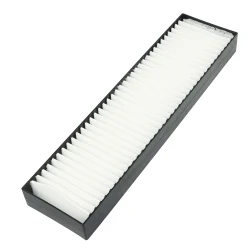Here's an overview of HEPA and carbon filters and their roles in air filtration
2024-04-07
A HEPA and carbon filter set is a combination of filters used in air purification systems to remove particulate matter, allergens, odors, and harmful gases from indoor air. Here's an overview of HEPA and carbon filters and their roles in air filtration:
1. HEPA Filter:
- HEPA stands for High-Efficiency Particulate Air. HEPA filters are designed to capture airborne particles as small as 0.3 microns with an efficiency of 99.97%.
- HEPA filters are made of densely packed fibers, typically fiberglass, arranged in a random pattern to create a maze-like structure that traps particles as air passes through.
- HEPA filters are highly effective at removing common indoor allergens such as dust mites, pollen, pet dander, mold spores, and fine particulate matter like PM2.5.
2. Carbon Filter:
- Carbon filters, also known as activated carbon or charcoal filters, are designed to adsorb and neutralize odors, volatile organic compounds (VOCs), and other gaseous pollutants.
- Activated carbon has a porous structure with a large surface area, allowing it to effectively adsorb odorous molecules and chemical contaminants from the air.
- Carbon filters are commonly used in air purifiers to eliminate household odors from cooking, pets, tobacco smoke, and chemicals emitted by household products and furnishings.
3. HEPA and Carbon Filter Set:
- A HEPA and carbon filter set combines both types of filters into a single unit or cartridge for air purifiers.
- The HEPA filter captures particulate matter and allergens, while the carbon filter adsorbs odors and gases, providing comprehensive air purification for improved indoor air quality.
- Some air purifiers feature a pre-filter stage before the HEPA and carbon filters to capture larger particles and prolong the lifespan of the main filters.
- The combined filtration of HEPA and carbon filters is effective for addressing a wide range of indoor air pollutants, including allergens, dust, smoke, odors, and volatile organic compounds.
4. Replacement and Maintenance:
- It's important to replace HEPA and carbon filters regularly according to the manufacturer's recommendations to maintain optimal air purification performance.
- HEPA filters may need replacement every 6 to 12 months, depending on usage and air quality conditions, while carbon filters may require replacement every 3 to 6 months.
- Regular filter replacement ensures continued effectiveness in removing airborne contaminants and preventing filter saturation or degradation over time.
Overall, a HEPA and carbon filter set provides comprehensive filtration for air purifiers, offering effective removal of both particulate matter and gaseous pollutants to improve indoor air quality and promote a healthier living environment.



